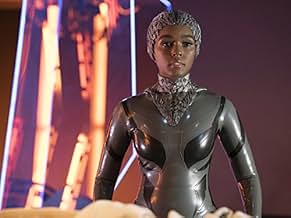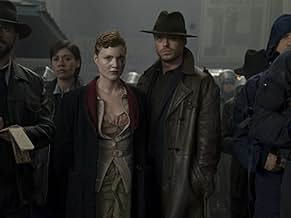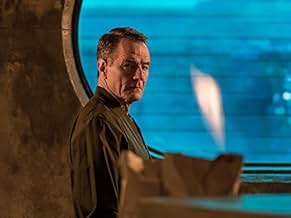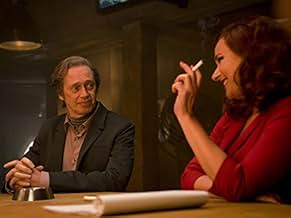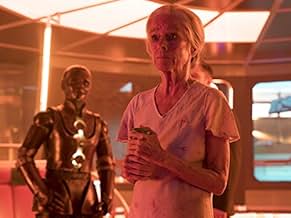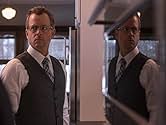Electric Dreams
- TV Series
- 2017–2018
- Tous publics
- 1h
A sci-fi anthology series with stand-alone episodes based on the works of Philip K. Dick.A sci-fi anthology series with stand-alone episodes based on the works of Philip K. Dick.A sci-fi anthology series with stand-alone episodes based on the works of Philip K. Dick.
- Nominated for 2 Primetime Emmys
- 1 win & 11 nominations total
Browse episodes
Featured reviews
This is an anthology series based on the works of futurist sci-fi writer Philip K. Dick. It's ten episodes switching back and forth between American production and British. Despite loving the Blade Runner franchise, I don't think I've ever read his work. This has a darker tone. Some of the British ones remind me of Black Mirror which was probably the original intent. It's a murky hit-and-miss proposition. I don't know about the Philip K. Dick part. His name is useful for selling this. It has some good sci-fi ideas. I like the darker tones but the lighter tones is awkward at times.
There can be no denying that on first look this episode of Electric Dreams borrows heavily from the likes of Blade Runner, Black Mirror, Children of Men... etc, but of course the source material for this provides inspiration for the aforementioned titles, and so it's get an originality pass in my book.
A key feature for me with sci-fi is the dealing with the creation of alternate universes, where key events change the course of evolution. On this front the episode succeeds within that premise. There have been many mediocre sci-fi presentations that have come and gone - set up with weaker writing and concepts, and possibly better acting (though I will give a special exception to Holliday Grainger, who put in a very good performance). If the future world is unconvincing, however, it drags the performances down. I felt it was convincing enough here.
In summary, is definitely worth a watch, and look forward to other episodes within the series - it's a short story and it's designed to make you think where the themes could possibly go within the world that's been created. And as such, it's succeeded. A test of it's success is that I'd have been quite happy seeing where the world would have progressed after the end scenes. A solid start.
A key feature for me with sci-fi is the dealing with the creation of alternate universes, where key events change the course of evolution. On this front the episode succeeds within that premise. There have been many mediocre sci-fi presentations that have come and gone - set up with weaker writing and concepts, and possibly better acting (though I will give a special exception to Holliday Grainger, who put in a very good performance). If the future world is unconvincing, however, it drags the performances down. I felt it was convincing enough here.
In summary, is definitely worth a watch, and look forward to other episodes within the series - it's a short story and it's designed to make you think where the themes could possibly go within the world that's been created. And as such, it's succeeded. A test of it's success is that I'd have been quite happy seeing where the world would have progressed after the end scenes. A solid start.
If you like to be fed the same recycled ideas about a futuristic vision by a blind eye; who's focus on how pathetic humans can be, even in the 'harshest' conditions of a time to come. You will surely be satisfied by this lame attemp.
I've enjoyed the whole series of stories. Well acted, great sets, great effects, good design. I have also enjoyed reading the works of P K Dick. The short stories are excellent and introduced many of the key ideas upon which all sci-fi was based. However watching the shows and reading the stories are two different things.
There is barely anything to compare them except perhaps a single key idea. The situations are changed, the characters are different, the settings, to time-frame, just about everything in the TV series is altered.
Are today's writers so devoid of ideas, that they have to take ideas some of them over sixty years old? Or is it that the TV corporate entities are such poor judges of writing talent that they dare not fund a series unless it has some big name at the top of the bill to exploit.
I'd hope that Mr. Dick, were he alive would enjoy the series, but I can't help thinking that he would not recognise his own story were is name not plastered over the top of the credits, and if it were not he'd be saying ' "oh I think I had an idea a bit similar to that in 1958"
There is barely anything to compare them except perhaps a single key idea. The situations are changed, the characters are different, the settings, to time-frame, just about everything in the TV series is altered.
Are today's writers so devoid of ideas, that they have to take ideas some of them over sixty years old? Or is it that the TV corporate entities are such poor judges of writing talent that they dare not fund a series unless it has some big name at the top of the bill to exploit.
I'd hope that Mr. Dick, were he alive would enjoy the series, but I can't help thinking that he would not recognise his own story were is name not plastered over the top of the credits, and if it were not he'd be saying ' "oh I think I had an idea a bit similar to that in 1958"
I was really excited to watch Stan's original Philip K. Dick's Electric Dreams but after watching the series I feel like they should have taken PKD's name out of the title.
After realizing they changed a lot of the endings to his original stories it made sense why the plots of the episodes felt misguided and confusing. PKD is a very clear cut writer, granted his novels such as Do Android's Dream of Electric Sheep? are a little "Inception-Like" in that some things are left a little unclear but for the most part he has very concise and clear endings to his stories because he's trying to convey a meaningful message.
Many of the episodes of this series use his source material extremely loosely and seem to use the film adaptations of his books as inspiration more than his actual books making them feel more like general sci-fi themed stories than true PKD ones. I also can't help but think of Black Mirror while watching and it feels as though they're simply trying to recreate the feeling of that.
I appreciate the way they use 70's iconography and keep the future looking gritty and focusing on the negative applications advanced technology can have as well as the benefits. The bleak outlook he always had on literally everything especially relationships is also quite prominent. On a whole it sort of does feel like Philip K. Dick but it really could have done a lot better if it had simply stuck to the source material and kept the endings true to them. For instance "Impossible Planet" had a much better ending in his story than the show tried to come up with, I get that the creators want to have some fun but if you're taking directly off of a master and then only changing a few things around you're going to fail since it was already great to begin with, that's why it's so well known. As they say, if it ain't broke don't fix it.
After realizing they changed a lot of the endings to his original stories it made sense why the plots of the episodes felt misguided and confusing. PKD is a very clear cut writer, granted his novels such as Do Android's Dream of Electric Sheep? are a little "Inception-Like" in that some things are left a little unclear but for the most part he has very concise and clear endings to his stories because he's trying to convey a meaningful message.
Many of the episodes of this series use his source material extremely loosely and seem to use the film adaptations of his books as inspiration more than his actual books making them feel more like general sci-fi themed stories than true PKD ones. I also can't help but think of Black Mirror while watching and it feels as though they're simply trying to recreate the feeling of that.
I appreciate the way they use 70's iconography and keep the future looking gritty and focusing on the negative applications advanced technology can have as well as the benefits. The bleak outlook he always had on literally everything especially relationships is also quite prominent. On a whole it sort of does feel like Philip K. Dick but it really could have done a lot better if it had simply stuck to the source material and kept the endings true to them. For instance "Impossible Planet" had a much better ending in his story than the show tried to come up with, I get that the creators want to have some fun but if you're taking directly off of a master and then only changing a few things around you're going to fail since it was already great to begin with, that's why it's so well known. As they say, if it ain't broke don't fix it.
Did you know
- Trivia"Electric Dreams" is a reference to PKD's novel that inspired "Blade Runner" titled "Do Androids Dream of Electric Sheep?"
- ConnectionsFeatured in WatchMojoUK: Top 10 Shows to Watch if You Like Black Mirror (2019)
Details
- Release date
- Countries of origin
- Official sites
- Language
- Also known as
- Philip K. Dick's Electric Dreams
- Filming locations
- Production companies
- See more company credits at IMDbPro
- Runtime
- 1h(60 min)
- Color
- Sound mix
Contribute to this page
Suggest an edit or add missing content






